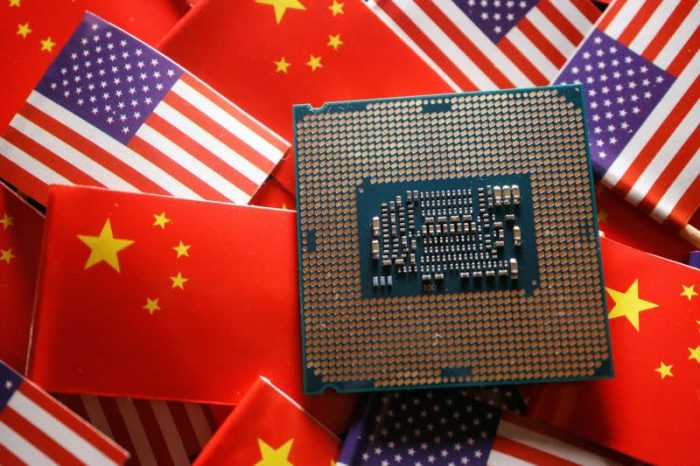Japan is on track to impose stronger restrictions on exports of chipmaking technologies to China amid mounting US pressure, the Financial Times has reported.
The US has been pushing allies Netherlands and Japan to ensure their firms require licenses to sell chip tech to China.
It also wants them to restrict servicing and maintenance of tools already sold to China — a move that would render chipmaking machines costing several billions worthless at some point.
Also on AF: US Pressing Korean Chipmakers For More China Chip Curbs
Early this month, the Netherlands government imposed restrictions along those lines on its chip tools giant ASML — and those curbs have created “significant production challenges” for Chinese chip firms.
But the FT report also outlines how Tokyo has been between a rock and hard place on the issue of chip tech exports, facing the risk of retaliation from both China and US.
Beijing has previously warned Japan that it would retaliate if Tokyo were to widen its chip curbs.
Japanese firms believe China would resort to a blockade on critical minerals like gallium and graphite that would hit the country’s semiconductor and electric vehicle industries.
Losing out on the Chinese market will also hit revenues of Tokyo Electron — Japan’s biggest semiconductor company. The firm earned nearly half its revenue from China in the second quarter of the year.
On the other hand, if Japan does not restrict its exports of chip tech, it faces the wrath of Washington’s “foreign direct product rule” — a provision the FT described as a “diplomatic bomb”.
First introduced in 1959, FDPR essentially says that if a product was made using American technology, the US government has the power to stop it from being sold.
The rule extends to products made in a foreign country as almost all chip factories contain critical tools from US suppliers.
“Straight strong-arming”
Negotiators involved in the talks between the US and Japan told the FT that the Biden Administration is racing to reach a deal with Tokyo ahead of the presidential election in November.
With just over six weeks to go before the election, the Biden government knows it faces a “time crunch” but is willing to let “dialogue suffer” for “an eleventh-hour win,” one person familiar with the negotiations told the FT.
The person went on to describe Washington’s approach as “straight strong-arming.”
Another source with knowledge of the negotiations told the FT that Washington had deployed commerce secretary Gina Raimondo and US ambassador to Japan Rahm Emanuel to head negotiations with Tokyo.
The two were taking a “bad cop, very bad cop” approach with Japan, the person said.
Meanwhile, a Japanese official told the FT, that Tokyo was finding it increasingly hard to read the Biden government’s “intentions” as the elections head closer.
Growing frustration with the US
The FT report also noted that Tokyo was “irritated” with growing US pressure considering the Biden government was working on blocking Japanese firm Nippon Steel’s acquisition of US Steel.
Washington has said the takeover poses “national security concerns”, despite warnings that if the deal falls through, it could put thousands of jobs at risk and hurt US ties with “staunch ally” Japan.
But frustrations with increasing US pressure to stem the flows of chips and chipmaking technologies to China — the world’s largest semiconductor market — are not being felt in Japan alone.
Earlier this month, ASML chief Christophe Fouquet said Washington’s chip war against China is ‘economically motivated’, and that it is getting “harder and harder” to make the case that it is about national security.
ASML — Europe’s most valuable tech company — has previously said it faces significant business risks from the expanding chip curbs. The company has also earned nearly half its revenue this year from China.
US officials are also pressing South Korea to restrict its chipmakers from selling advanced memory chips to China.
- Vishakha Saxena
Also read:
China Threatens to Cut Off ASML Over New US Chip Curbs
China’s Critical Minerals Blockade Risks Global Chip Shortage
China Likely to Spend $50 Billion on Chip Equipment This Year
US Tech Firms Face ‘Death Spiral’ From New China Curbs: Lawmakers
Huawei’s China-Made 7nm Chip ‘Years Behind US’, Raimondo Says
US Set to Double Tariffs on Chinese Semiconductors in 2025 – TH
Huawei, SMIC Set to Defy US Sanctions With 5nm Chips: FT
China to Lead 2024 Chip Expansion with 18 New Fabs – SEMI
























